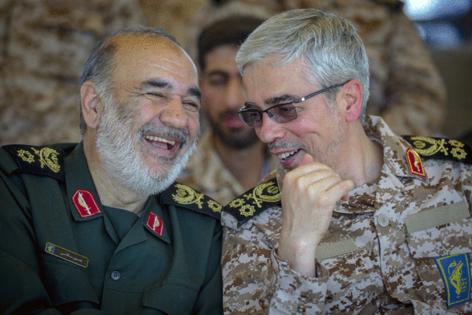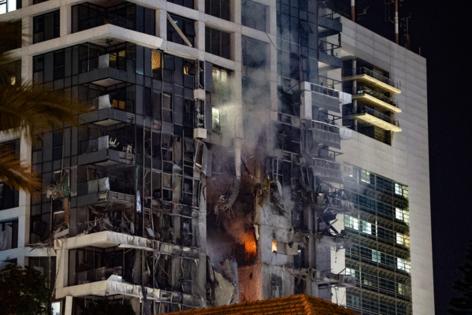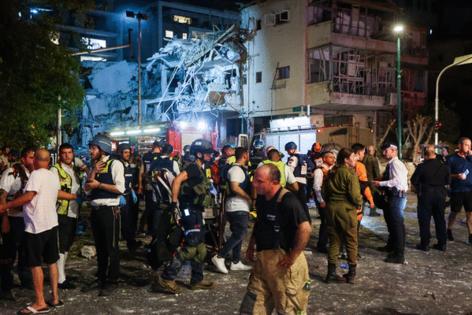Iran launches new attack wave on Israel as conflict widens
Published in News & Features
Iran fired hundreds of ballistic missiles against Israel following an unprecedented direct attack on its nuclear facilities, ramping up a conflict between sworn enemies that threatens to engulf the Middle East and disrupt global oil supplies.
Multiple waves of missiles targeting Israeli cities amount to the most forceful step yet by Tehran since Israel’s overnight raids killed top Iranian generals and badly damaged key military infrastructure.
Israel said it identified missiles launched from the Islamic Republic and reported explosions from interceptions and falling debris from incoming projectiles. There was dramatic video footage of at least one large explosion in Tel Aviv, and reports of explosions over Jerusalem.
The extent to which Israel’s air defenses were pierced remains to be seen, with U.S. forces helping to intercept and shoot down Iranian attacks. Markets took another hit from the surge in tensions: The S&P 500 lost over 1%, wiping out this week’s advance. West Texas Intermediate crude futures surged more than 7%, the most since March 2022. Gold and the dollar rose.
In Iran, state media reported that air defenses were reactivated in expectation of a response.
The intense volleys marked a turning point for both nations, testing new limits in terms of their aggression and willingness to escalate.
When the pair targeted each other last year, there was a greater time lag and a sense that after an exchange of fire, there would be a détente. This time, Israel has indicated this is an operation that could last weeks.
This poses an existential problem for Iran, and a question of whether it can match its fiery rhetoric with actions. Israel has dramatically exposed its weaknesses, decimated its proxies and taken out key leaders.
Additional escalations — particularly any targeting of American military or diplomatic facilities in the region — could rally domestic political support, but could dramatically intensify the conflict. It was unclear if Tehran was entertaining last-resort options such as blocking the Strait of Hormuz, one of the world’s most vital oil arteries, in a scenario investors fear the most.
Iran’s Supreme Leader Ayatollah Ali Khamenei vowed to “act forcefully” in a prerecorded video message carried by state TV. His statement was released after Iran started its retaliation.
Unlike previous responses, this one came much faster. Given Israeli Prime Minister Benjamin Netanyahu has followed through on his long-promised threat to dismantle Iran’s nuclear program, Iran was feeling the pressure to find a commensurate answer.
So far, Israel has chosen to keep the United States out of the conflict — a decision that an analysis by Bloomberg Economics suggested was the most likely since Tehran can’t afford to go to war with the world’s biggest economy and mightiest military. The backdrop are indirect nuclear talks between the Islamic Republic and the U.S., with a sixth round of negotiations scheduled to take place Sunday.
But the damage to its standing in the region is real. The head of the Islamic Revolutionary Guard Corps, Hossein Salami, and the military’s chief of staff, Mohammad Bagheri, were both killed in Israeli strikes. At least two other senior IRGC members also died and several nuclear facilities were targeted.
Iran informed the International Atomic Energy Agency that Israel struck the nuclear sites at Fordow and Isfahan as part of its wave of attacks in the last 24 hours, Director General Rafael Mariano Grossi told the U.N. Security Council on Friday.
Grossi said the IAEA doesn’t have information beyond indications that military activity took place around those facilities. But the move is important — if the facility at Isfahan is disabled, it would seriously crimp Iran’s ability to enrich uranium in large volumes.
Israel “should not think that it is over. We won’t allow them to escape unscathed from this great crime they have committed,” Khamenei said.
But the Iranian supreme leader’s terse statement shows Iran is probably not prepared to make any concessions. Iran’s Foreign Minister Abbas Araghchi said Friday’s attacks have derailed diplomacy.
Meanwhile, with the Group of Seven leaders gathering in the Canadian Rockies, the attention will focus on how U.S. President Donald Trump will react — or not. Going into the summit, there was a common desire to keep fraught geopolitical issues off the table but that will be difficult to do given the knock-on effects of a spike in oil prices on inflation and energy exports.
Given the region is such a big crossroads for shipping of not just oil but consumer goods, any all-out war will further strain a global trading system disrupted by the trade wars.
For his part, Trump gave brief telephone interviews to a smattering of journalists, particularly those from cable news networks, but otherwise didn’t take to the cameras to make public remarks. The White House said Trump was not expected to emerge Friday night, though he could always turn to social media or additional interviews with the media.
On Saturday, Trump’s 79th birthday, he’s scheduled to host a military parade ostensibly to celebrate the US Army’s 250th year. He took to social media to warn Iran to make a deal “before it is too late.”
Come Saturday, the extent of the damage on both sides will come into focus.
Israel said more than 200 aircraft participated in the operation that targeted around 100 locations across Iran. At least 95 people were wounded and several residential buildings in Tehran’s suburbs were hit, according to Iranian media. Iran’s ambassador to the United Nations said 78 people were killed in the attacks. One woman was killed in the Tel Aviv area, a police spokesman in Israel said.
Netanyahu and Trump spoke by phone Friday to discuss the conflict, according to a White House official.
The U.S. has said it did not play a role in Israel’s initial volley, and warned Iran against retaliation against American service members. The U.S. role assisting Israel’s aerial defense is customary, but what it does next will be critical.
_____
(With assistance from Jonathan Tirone.)
_____
©2025 Bloomberg L.P. Visit bloomberg.com. Distributed by Tribune Content Agency, LLC.












Comments